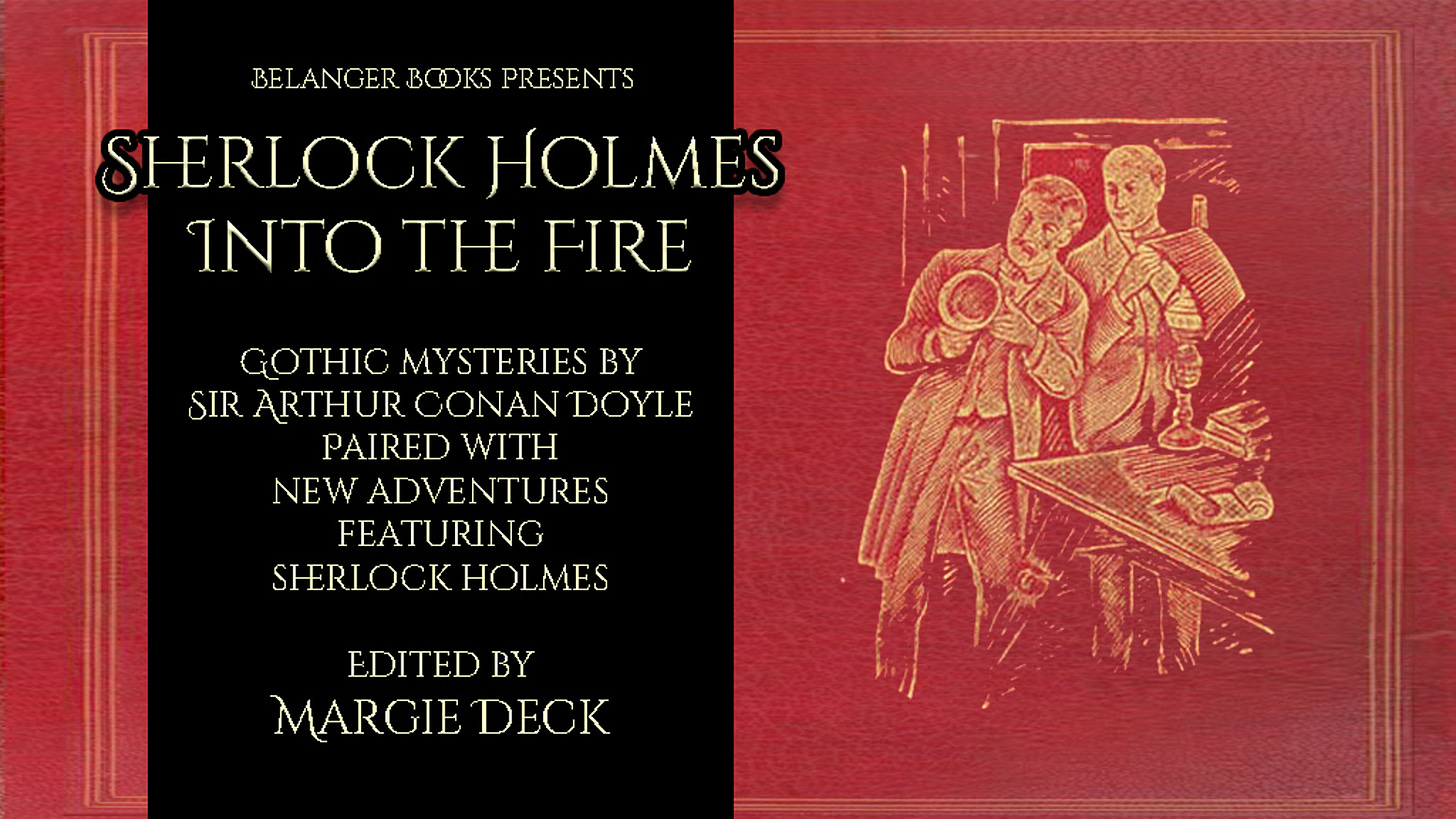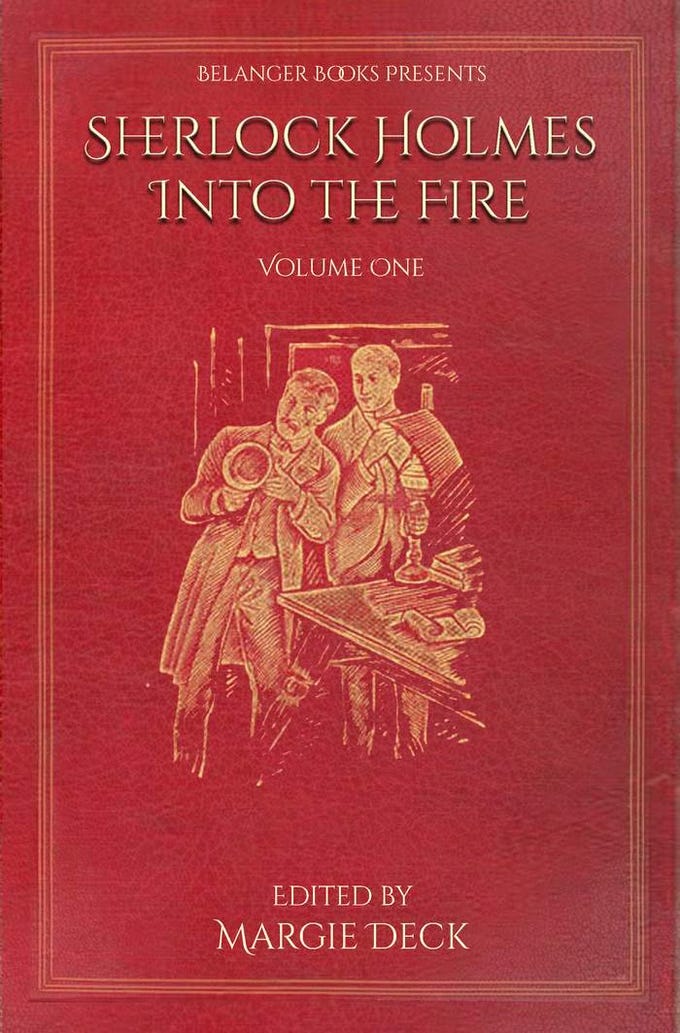INTO THE FIRE
THE RETELLING OF DOYLE’S ROUND THE FIRE STORIES
Few literary figures are as resilient or as protean as Sherlock Holmes. Across centuries, continents, and countless adaptations, the Great Detective has faced everything from garden-variety blackmailers to interstellar threats. But in Sherlock Holmes: Into the Fire, edited by Margie Deck, Holmes faces some of his most unnerving challenges yet—ones that emerge not from logic and reason but from the shadowy borderlands of the grotesque, the macabre, and the unexplained.
This ambitious two volume anthology, with a total of seventeen tales, draws its inspiration from one of Sir Arthur Conan Doyle’s lesser-known but thematically rich collections—Round the Fire Stories (1908). These original stories, many of which have a Gothic, even Lovecraftian flavor, explored what Doyle himself called the grotesque and the terrible. While they did not always feature Holmes, their atmosphere of unease, their flirtation with the supernatural, and their emphasis on moral ambiguity and psychological dread made them perfect soil for reinvention.
What Deck and her team of seventeen writers have done is ingenious: they have taken each of these eerie fireside tales and inserted Holmes into them, not merely as a guest star but as a central figure. In doing so, the anthology becomes a fascinating exercise in literary archaeology and imaginative pastiche—what would happen if Holmes were dropped into some of Doyle’s darkest corners?
One of the anthology’s strongest assets is its commitment to the tone and texture of the original Doyle stories—in this case a firelight glow on unease. These are not flashy modernizations or ironic sendups. The authors understand the late-Victorian ambiance—the gaslit fog, the whispered rumors, the closed parlors hiding terrible secrets—and they revel in it. The prose in many of these stories mimics Doyle’s cadence with admirable fidelity, and the pacing often reflects the slow burn of traditional Gothic storytelling—a small clue here, a strange confession there, a growing sense that something is deeply amiss.
From crumbling manors and lonely train stations to bizarre encounters with the seemingly inexplicable, each tale wraps Holmes and Watson in a narrative of dread. This is Sherlock Holmes by way of Poe, Machen, or Le Fanu—a Holmes who must reckon not only with human depravity but with cosmic oddities that refuse to submit to rational categories.
Another triumph of the collection is its consistent and believable portrayal of Holmes and Watson. Despite the strangeness of their surroundings, both characters remain grounded in the logic and deductive methodology that defines them. Holmes, in particular, does not waver in the face of the uncanny; he resists it, interrogates it, exposes it. This consistency lends a particular pleasure to the stories: we know that no matter how bizarre the circumstances, Holmes will meet them with cool precision.
Yet there are moments—skillfully seeded throughout—where even Holmes’ worldview is strained. These are not tales of Holmes being reduced or humbled, but of him confronting the limits of his tools. He doesn’t blink in the face of horror, but sometimes, he pauses. These hesitations add richness to his character, showing him not as an infallible machine but as a deeply rational man navigating irrational territory.
Watson, ever the reliable narrator, brings his trademark blend of warmth and astonishment to these proceedings. In several stories, his emotional responses serve as a foil to Holmes’s detachment, grounding the tales in human stakes and offering readers a touchpoint amidst the eerie goings-on.
While the overall quality of the collection is impressively high, a few tales stand out...
The Adventure Of The Rodenhorst Ghost—This reimagining of Doyle’s tale The Brown Hand, about colonial guilt and ghostly vengeance, becomes a powerful meditation on justice and retribution, with Holmes drawn into a mystery that challenges both his skepticism and his conscience.
The Adventure Of The Beetle Hunter—A seemingly straightforward entomological obsession, taken from Doyle’s original version The Beetle Hunter, veers into strange territory, and Holmes must determine whether his client is mad, haunted, or both. The atmosphere in this piece is especially rich—sticky, close, and unsettling.
The Adventure Of The Jungle Cat—Here, the original story (The Brazilian Cat)—with its combination of exoticism and family greed—is given a sharper edge, with Holmes untangling a plot that dips into madness and cruelty.
The Problem Of The Dreaming Man—Perhaps the most viscerally disturbing of the batch, this story—a redux of The Leather Funnel—uses Holmes’ rationalism as a bulwark against pure horror—but just barely. It’s a masterclass in discomfort.
Each of these tales pays homage to Doyle’s themes while expanding them. The authors deftly balance familiarity and innovation, never straying too far from the Holmes canon but never afraid to stretch its boundaries.
Margie Deck deserves enormous credit for curating a project of this scope with such consistency of tone and quality. Anthologies often suffer from unevenness, but Into the Fire feels impressively unified. The introductory materials are thoughtful, and the sequencing of the stories builds a cumulative atmosphere. As the book progresses, the mood darkens and the mysteries deepen, until the reader, like Holmes himself, is thoroughly engulfed in the firelight flicker of dread.
Sherlock Holmes: Into the Fire is a triumph of literary imagination, pastiche, and editorial vision. It reminds us that the worlds of mystery and horror are not mutually exclusive—and that Holmes, that paragon of logic, is at his most fascinating when reason is not quite enough. For readers who crave a Holmes beyond the usual gaslamp adventures—who want their Baker Street served with a side of the uncanny—this is an indispensable collection. Dare you read it by firelight on a winter’s night? You should. But perhaps not alone.
Paul Bishop is the author of fifteen novels, including the award winning Lie Catchers. He is also the editor of 52 Weeks 52 Sherlock Holmes Novels—a multi-author compendium of essays regarding fifty-two of the best Sherlockian pastiches plus much more—Available on Amazon or from Genius Books...




